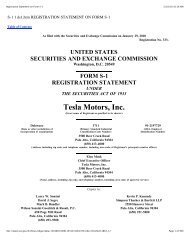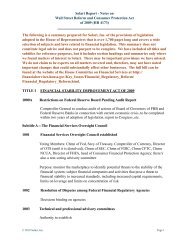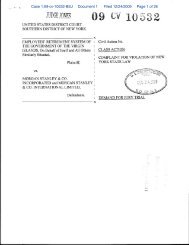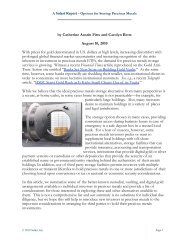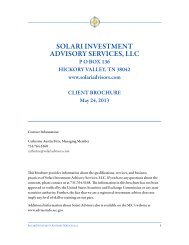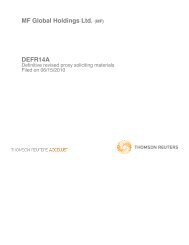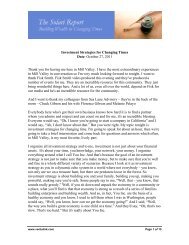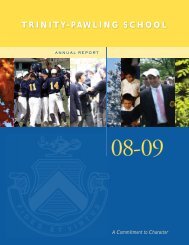Q3 01webb.qxd - Dillon Read & the Aristocracy of Stock Profits
Q3 01webb.qxd - Dillon Read & the Aristocracy of Stock Profits
Q3 01webb.qxd - Dillon Read & the Aristocracy of Stock Profits
Create successful ePaper yourself
Turn your PDF publications into a flip-book with our unique Google optimized e-Paper software.
THE BEAUTY<br />
OF THE<br />
“DON’T WORRY,<br />
BE HAPPY”<br />
MODEL OF<br />
FINANCING<br />
COMMUNITIES WITH<br />
OBFUSCATED<br />
TAXPAYER LOSSES<br />
DIVORCED<br />
FROM<br />
THE ECONOMIC<br />
REALITY OF RISK,<br />
IS THAT<br />
EVERYONE<br />
EVENTUALLY<br />
BUYS<br />
INTO IT.<br />
S ANDERS R ESEARCH A SSOCIATES<br />
As an economic development consultant from Philadelphia said to me, “I don’t<br />
understand. I just had lunch with a guy from a large bank. They are financing<br />
housing that costs $150,000 per unit and selling it for $50,000. He says <strong>the</strong>y are<br />
making a ton <strong>of</strong> money. How can that be?” I <strong>the</strong>n explained what happens when<br />
you can create various combinations <strong>of</strong> tax shelters and tax credits and tax<br />
write-<strong>of</strong>fs and tax exempt bonds and empowerment zones and mortgage passthroughs<br />
with rich guaranteed financing and subsidies, all in no-risk packages.<br />
Investors such as pension funds, endowments and foundations do not even have<br />
to pay taxes on <strong>the</strong>ir income and capital gains.<br />
The beauty <strong>of</strong> <strong>the</strong> “don’t worry, be happy” model <strong>of</strong> financing communities<br />
with obfuscated taxpayer losses divorced from <strong>the</strong> economic reality <strong>of</strong> risk, is<br />
that everyone eventually buys into it. Local residents do not want <strong>the</strong> neighbourhood<br />
to get better because <strong>the</strong>ir rents or home taxes would rise and <strong>the</strong>y<br />
would be forced out. Local small businessmen would lose <strong>the</strong>ir livelihood if<br />
commercial rents went up. Local organisations are increasingly dependent on<br />
government subsidies that <strong>the</strong>y win by persuading someone that things are dire<br />
and people need lots <strong>of</strong> expert help as <strong>the</strong>y—by some mystery—are unable to<br />
turn <strong>of</strong>f <strong>the</strong>ir TVs and go down to <strong>the</strong> library or community college to get an<br />
education. Everyone adjusts to a perverse model: neighbourhood equity down,<br />
Dow Jones Index up, debt up, crime up. It is all because that is how his or her<br />
financial incentives have come to work.<br />
Meantime, <strong>the</strong> guys making all <strong>the</strong> money on <strong>the</strong> drugs take a small portion<br />
that <strong>the</strong>y write <strong>of</strong>f by moving it into charities and foundations. That means<br />
some <strong>of</strong> <strong>the</strong>ir principal can be invested tax exempt in perpetuity. Meanwhile <strong>the</strong><br />
percentage <strong>of</strong> income that is spent for charitable purpose can go for a series <strong>of</strong><br />
activities that keeps <strong>the</strong> bleeding hearts preoccupied. That way no one interferes<br />
with <strong>the</strong> fundamental issues and instead are preoccupied on token successes and<br />
systemic failures that help brand <strong>the</strong> donors as good and <strong>the</strong> poor as hopeless.<br />
And so HUD plays an important role in <strong>the</strong> transition <strong>of</strong> neighbourhoods in<br />
which all <strong>the</strong> players have a vested interest in <strong>the</strong> neighbourhood succeeding in<br />
<strong>the</strong> most cost effective manner, to one in which <strong>the</strong> players make money on<br />
failure or indifference. HUD has over $500 billion <strong>of</strong> mortgage insurance<br />
outstanding and an equivalent amount <strong>of</strong> mortgage securities backed up by <strong>the</strong><br />
taxpayer’s full faith and credit through HUD’s mortgage agency, Ginnie Mae.<br />
BUBBLEMANIA ASIDE, 2 PLUS 2 STILL ADDS UP TO4<br />
There are two problems with federal investment in <strong>the</strong> US. The first is <strong>the</strong><br />
imbalance between sources and uses. The second is that rates <strong>of</strong> return are<br />
negative. Let’s look at what is going on and why.<br />
In a nutshell, Washington is a financial mechanism that raises $1 from <strong>the</strong><br />
American people and <strong>the</strong>n invests $2 dollars back. If <strong>the</strong> politicians in<br />
Washington ask for ano<strong>the</strong>r dollar to balance <strong>the</strong> equation, <strong>the</strong>y are voted out<br />
<strong>of</strong> <strong>of</strong>fice. If <strong>the</strong>y borrow ano<strong>the</strong>r dollar to balance <strong>the</strong> equation, <strong>the</strong>y are<br />
criticised soundly. If <strong>the</strong>y cut spending by a dollar, <strong>the</strong>y are again voted out <strong>of</strong><br />
<strong>of</strong>fice. It is easy to see why <strong>the</strong> debt has gone up.<br />
2001 THIRD Q UARTER C OMMENTARY - PAGE 13



